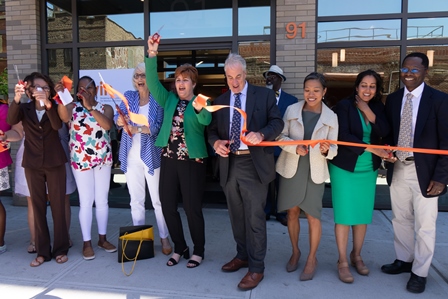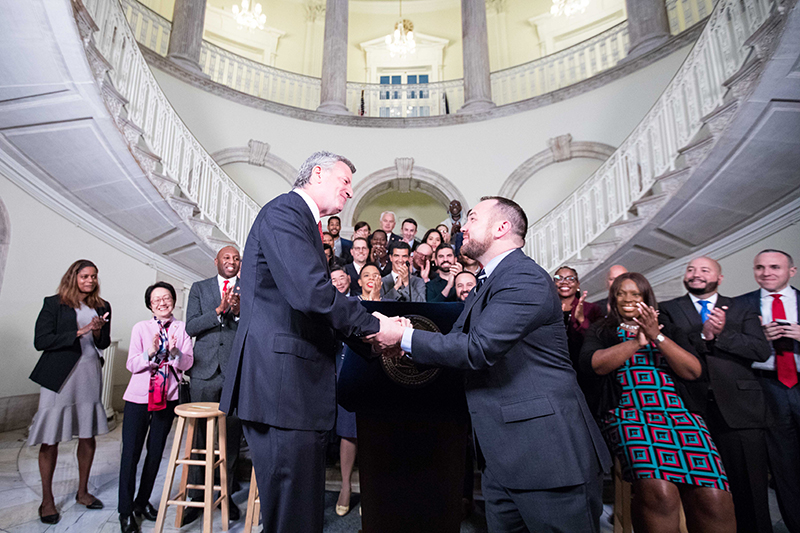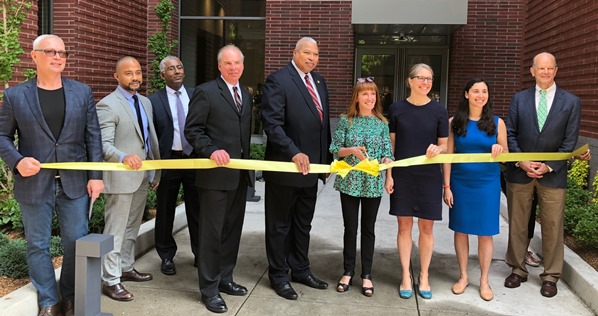

Showing Posts by Date: 06/2018
06.26.2018
View the photo slideshow here!
The 18th Annual Supportive Housing Conference was a celebration of New York’s unique leadership in development, financing and social services in supportive housing. With over 1,700 registrants, 22 workshops and a keynote by acclaimed author and poet, Jacqueline Woodson, it was our most successful conference yet!
The day began with the Network’s Board Chair Brenda Rosen welcoming the crowd. The Network’s Executive Director Laura Mascuch thanked the supportive housing community for setting the example for what supportive housing can do to break the cycle of homelessness. She recognized the social staff and shared their stories of dedication and transformation with the audience.
“I want to take this moment in time to speak about the staff who work in supportive housing day-in and day-out. Many of you are in the room today, you are the reason why transformation can happen in individual lives,” she said.
Our keynote speaker for the event, Jacqueline Woodson moved the crowd to tears with her reading of Each Kindness and talking about empathy and kindness and what it means for homeless people to not be seen. She applauded attendees for their dedication and hard work in providing a helping hand to those most in need.
Eight simultaneous workshops in the morning session followed the keynote. The highly popular “Addressing the Homelessness & Affordable Housing Crisis” panel included key city and state policy makers: Steven Banks, NYC Department of Social Services Commissioner; Barbara Guinn, NYS Office of Temporary and Disability Assistance (OTDA)’s Executive Deputy Commissioner; Dr. Ann Marie T. Sullivan, NYS Office of Mental Health (OMH) Commissioner; Maria Torres-Springer, NYC Department of Housing Preservation and Development (HPD) Commissioner; RuthAnne Visnauskas, NYS Homes and Community Renewal (HCR) Commissioner and CEO, and moderated by the Network’s Laura Mascuch.
The morning also included a standing-room-only presentation by Marc Dones, a prominent anti-racist trainer and educator. Marc explored the glaring racial disparities in homelessness trends and trajectories and discussed the role racism has played in the homelessness crisis. They also conducted a second late-afternoon workshop on how to implement anti-racist policies at your organization.
This year we also had members of the New York Police Department presenting with representatives from the Department of Health and Mental Hygiene about new strategies and programs they are implementing to improve responses to crises involving people struggling with mental health issues.
Another popular morning session included a panel on siting for new developments. Moderated by Council Member Stephen Levin, the workshop panelists included nonprofit developers, a government partner and a consultant. This group shared tips and success stories on how nonprofits can work with local community groups and businesses to garner support.
Other morning workshops included a panel discussion on the Joint Venture Guidebook, a panel on cost containment, a panel on using the “Explosive Child” approach by members of the Center for Urban Community Services’ Intensive Mobile Treatment team and a presentation by Joseph’s House & Shelter on “Ethical Dilemmas in Housing First for Families.”
Attendees enjoyed a networking luncheon and then returned for two rounds of afternoon workshops.
Some highlights from the afternoon workshops included a thought-provoking discussion moderated by Council Member Rafael Salamanca on how nonprofits and community organizations are battling the opioid crisis among the homeless population with representatives from Acacia Network, Care for the Homeless, Project Renewal and BronxWorks.
A conversation on the City’s commitment to creating 15,000 new units of supportive housing was also in the afternoon line-up. It included HRA’s Kristin Misner-Gutierrez, HPD’s Emily Lehman, and DOHMH’s Gail Wolsk, and was moderated by the Network’s Rebecca Sauer.
A standing-room-only discussion on “Housing for Health: Lessons from LA” featured Dr. Mitchell Katz, President of NYC Health + Hospitals and Bill Pickel, Executive Director of Brilliant Corners moderated by Deputy Mayor of Health and Human Services, Dr. Herminia Palacio. The panelists discussed the unique program that has already housed more than 4000 homeless people in less than four years, with a goal of eventually housing 10,000. Other workshops focused on conflict resolution and addressing vicarious trauma for staff. We also had an excellent conversation on how best to serve aging tenants and the needs of trans and gender non-conforming tenants.
We also had workshops focusing on development and finance including “Developing Supportive Housing in Trying Times,” and “From the Board Room to the Budget: Realizing Your Housing Development Vision.”
The late afternoon sessions also featured some more policy focused workshops. Members of the ESSHI workgroup discussed the first two years of implementing and supporting new development under the ESSHI program and the eleven different populations it serves. Other policy conversations included one on hopes and fears of housing policies on a federal level.
There was also a panel to discuss the new CAPS (Coordinated Assessment and Placement Systems) process, which is now mandated by HUD and kicked off implementation in January 2018.
Lamb Financial Group sponsored our ever-popular cocktail reception in the Marriott Marquis’ spectacular lounge overlooking Broadway.
We would like to express our enormous gratitude to everyone who attended, spoke at, and volunteered for the conference. We salute you, and thank you for working together to fulfill the largest commitment to supportive housing in history. Hope to see you again at next year’s conference!
Watch our conference slideshow here.
06.25.2018

On Thursday June 14, Win celebrated the opening of Stone House, the largest supportive housing development for families in New York State. Named after Win’s former president, Bonnie Stone, Stone House will bring 160 units of affordable and supportive housing to the Brownsville neighborhood of Brooklyn.
Win’s CEO Chris Quinn welcomed the audience and introduced all the speakers for the program that included: Former Win CEO Bonnie Stone; Maria Torres-Springer, Commissioner of the NYC Department of Housing Preservation and Development (HPD); Paula Roy Carethers from NYC Housing Development Corporation; Dana Greenberg from NYS Office of Temporary and Disability Assistance (OTDA); Jeff Barker, NYS President for Bank of America Merrill Lynch; Maygen Moore from the Corporation for Supportive Housing, as well as representatives from the Brooklyn Borough President Erik Adam’s office and NYC Mayor’s Office of Environmental Remediation.
“We know that New York City is battling twin crises of homelessness and affordable housing. Low income wages are not growing but rents are just always on the rise. And this crisis is a crisis for families,” said Chris Quinn in her opening remarks to the audience.
Bonnie Stone, who was Win’s CEO when this project kicked off, thanked all the partners for the successful completion of this project and expressed her immense joy at seeing Stone House ready to take in residents.
“This is such a gift. 160 families have found their homes here at Stone House,” she said.
HPD Commissioner, Maria Torres-Springer also spoke at the event. She congratulated Win and announced the approval by city government of an additional $100 million in capital funding to accelerate the development of supportive housing from 500 to 700 units.
“Developing supportive housing and working to end homelessness is not a marathon or a sprint, but a relay. We have to keep going and pass on the baton to the next person. It really is heartwarming and such an honor to be here today,” she added.
The star of the show though was a tenant of Stone House, Regina Wright. She shared with the audience her struggles and what it was like to finally be leaving a shelter with her two kids.
“When I saw this apartment I thought it was the model. Then they told me it was mine! I cried,” she said.
Replacing a vacant lot, Stone House took 10 years from concept to development. It features a computer lab, a beautiful children’s playground, and a community room. It provides 96 supportive housing units and 64 affordable units at a time when more than 60,000 people are homeless in New York City.
The funding for Stone House was provided through a tax credit equity by the HPD Supportive Housing Loan Program, the NYC Housing Development Corp., the New York State Homeless Housing and Assistance Program under the Office of Temporary Disability Assistance, Department of Justice Settlement Funds through Bank of America Merrill Lynch, the Mayor's Office of Environmental Remediation, Corporation for Supportive Housing, and low income housing tax credit (LIHTC). Equity
Corporate partners include The Richman Group as LIHTC syndicator, the Bank of America Merrill Lynch as construction lender, Win joint venture partners FCA Realty, with additional support from the Google Community Foundation and Riley Home, which is providing blankets to new residents.
The development offers comprehensive social services funded by the NYC Department of Health and Mental Hygiene. Stone House was designed by Urban Architectural Initiatives (UAI) and the contractor was Cheever Development Corporation.
| Openings06.25.2018
Last week, HCR released its Multifamily Open Window Request for Proposals. Applications will be accepted throughout the year with a final due date of March 31, 2019.
The $697 million affordable housing capital funding opportunity in this RFP consists of 12 different funding programs (listed below), including The Supportive Housing Oppurtunity Program (SHOP).
There are a number of changes to the SHOP term sheet this year, for which the Network advocated over the past several months with our state government partners. These changes include:
1) Maximum Awards in NYC:
Up to $200,000 per unit for ALL residential units in projects where at least 50% of the units are designated as permanent supportive housing.
Projects leveraging funds from the City of New York are eligible for up to $100,000 per unit.
Projects with less than 50% supportive housing and leveraging funds from the City of New York will not be eligible for maximum subsidy amounts and will be evaluated on a case-by-case basis.
Preference is given to projects with at least 50% supportive housing units.
2) Supportive Services & Operating Funding:
HCR anticipates that the operating funding from the services and operating source will at least cover real estate maintenance and operating expenses for the supportive housing units. Applications should underwrite rents for supportive housing units at an amount affordable to households earning at least 50% AMI.
3) High Cost Medicaid User Requirement:
Projects of 15 or more ESSHI units, with 30 or more units in total serving applicable populations, will be required to set aside 25% of designated ESSHI units for high-cost, high-need Medicaid users. The applicable populations are serious mental illness (SMI), substance use disorder (SUD), individuals diagnosed with HIV/AIDS, chronic homelessness, homeless frail elderly/seniors, and individuals with developmental disabilities.
The complete list of programs in this RFP include:
Small Building Participation Loan Program: $20 million
For more information on the Open Window RFP, contact:
Leora Jontef
Vice President, Multifamily Finance – New Construction
New York State Homes and Community Renewal
(212) 872-0537
leora.jontef@nyshcr.org
Friendly Reminder – OTDA will begin accepting OTDA HHAP applications this Thursday, June 28th. Get your applications in early! Last year, the window closed after only being open for four months due to the overwhelming demand.
Under HHAP, grants and loans are provided to acquire, construct and rehabilitate housing for persons who are or would otherwise be homeless. Eligible projects may provide permanent, transitional or emergency supportive housing to homeless single individuals or families. Not-for-profit corporations and their subsidiaries, charitable organizations, municipalities, public corporations, public housing authorities, and certain joint-ventures are eligible to apply for HHAP funding.
Priority points will be given to:
Applications that propose supportive housing developed utilizing services and operating funding obtained or to be obtained through the Empire State Supportive Housing Initiative (ESSHI); or
Applications that propose supportive housing projects targeted to veterans or that give priority to veterans by placing them ahead of other homeless populations on the project waiting list.
$64 million is available, of which $5 million may be reserved for the development of projects serving homeless persons with HIV/AIDS. Additionally, up to $1 million may be used for emergency shelter repairs in local social service districts with a population of less than five million.
This RFP is an open-ended RFP, meaning proposals will be accepted for consideration on a continuous basis until it is determined funds are no longer available for award or this methodology no longer serves a purpose for HHAC.
To view the RFP on the OTDA website, click here.
Important Dates:
Questions may be submitted via mail, fax or email to:
Ms. Dana Greenberg
NYS Office of Temporary and Disability Assistance
40 North Pearl Street, 10-B
Albany, NY 12243
Fax: (518) 486-7068
Dana.Greenberg@OTDA.ny.gov
Project Based Section 8 - In New York City, housing developers can now access Project-Based Section 8 for rental subsidies. In such instances, the ESSHI services and operating award will be reduced to account for services only.
More Flexibility Between ESSHI Conditional Awards and Capital Funding – According to the ESSHI Questions & Answers the Interagency Workgroup is allowing conditional awardees to modify certain aspects of the proposal based on the needs of the capital funding agency or other issues related to the feasibility of the project. Examples cited include the relocation of the site or changes in number of units. Any changes would have to be approved by the ESSHI Interagency Workgroup.
We appreciate our government partners commitment to this groundbreaking program to create 20,000 supportive housing units over the next 15 years and their willingness to work together to ensure its success!
For any questions related to ESSHI, please call the Network’s Albany office at 518-465-3233.
| Funding06.19.2018

On June 11th, Mayor Bill de Blasio, City Council Speaker Corey Johnson, Council Finance Chair Daniel Dromm and members of the City Council came to an agreement for an on-time and balanced City budget for Fiscal Year 2019, beginning on July 1st. The expense budget totals $89.15 billion and the capital budget totals $11.2 billion.
In light of the acuity of the homelessness crisis and the support of both our agency partners and the City Council, the FY2019 adopted budget accelerates $100 million in capital funding for supportive housing to increase the annual production by 40 percent, from 500 newly constructed units per year to 700. The Network greatly appreciates that the City of New York recognizes the importance of our members’ work and looks forward to assisting both the City and our members in implementing the acceleration of NYC 15/15.
Additionally, to implement the acceleration of NYC 15/15 development, the adopted budget added $1.85 million to the HPD expense budget in FY2022 (and baselined into the out-years). This adjustment will provide funding for rental assistance for the additional 200 congregate units produced in FY2019-2022 that will begin coming online. The budget also added $2 million to the DOHMH expense budget beginning in FY2022 (baselined) to fund services for NYC 15/15 units.
| Funding06.08.2018
Laura Mascuch, the Network's Executive Director co-authored with CEO of Breaking Ground, Brenda Rosen, an op-ed on the impact of HUD's new rent increase proposal.
Check it out: The Damage is in the Details of HUD’s Proposed Rent Policy Changes
| Funding, New York State, Federal, Press06.01.2018

State and city officials, partners and friends gathered on May 11 to celebrate the opening of Webster Residence, an eight story supportive housing building in the Bronx. The Webster Residence features 170 studio apartments, which will be home to low-income and formerly homeless disabled individuals.
Brenda Rosen, President and CEO of Breaking Ground, kicked off the ceremony thanking the project’s partners and remarking that she is delighted to be opening the organization’s fourth supportive/affordable development in the Bronx noting, “Bronx holds a special place in my heart as this is where I spent my early years. I’m thrilled to be part of its revitalization,” Brenda added.
Brenda was joined by RuthAnne Visnauskas, Commissioner/CEO, NYS Homes and Community Renewal; Samuel Roberts, Commissioner NYS Office of Temporary and Disability Assistance (OTDA); Caren Abate, Housing Director at NYS Office of Mental Health (OMH); Emily Lehman, Assistant Commissioner at NYC Department of Housing Preservation and Development (HPD), alongside Fabian Ramirez from Capital One, Sam Ganeshan from Hudson Housing Capital and Tony Hannigan, CEO of CUCS.
RuthAnne Visnauskas spoke about the transformative impact of housing on the lives of the tenants. She also emphasized the importance of government partnerships and the role of elected officials in making projects like the Webster Residence possible.
“It is a good day when Commissioner Roberts and I are together, it means that more supportive housing is being built across the state. I also want to thank our elected officials. It is extremely valuable for us to have their support on affordable and support projects like this one,” she remarked.
Caren Abate from NYS OMH congratulated Breaking Ground on the opening and spoke about the importance of quality housing for those suffering from mental illnesses.
“Safe and stable housing gives individuals who are recovering from mental illness a safety net. It offers them the opportunity to focus on their health and future goals without having to worry about where they are going to put their head at night,” she said.
Funding for this project was provided by NYC Department of Housing Preservation and Development (HPD), NYS Homes and Community Renewal (HCR), NYS Office of Temporary and Disability Assistance (OTDA), Hudson Housing Capital and Capital One Bank. Breaking Ground acquired the site in 2014 with a bridge loan from the New York City Acquisition Fund and the Low-Income Investment Fund.
The building features a multipurpose room for tenant and community events, a computer lab, fitness room, bike storage, and a beautifully landscaped courtyard that connects Webster to its companion building, the 248 unit Park House. Comprehensive social services will be funded by the NYS Office of Mental Health (OMH). The building was designed by COOKFOX Architect and Mega Contracting Group was the contractor for the project.
| Openings